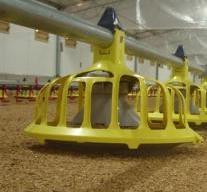Dioxin contaminated feed causes poultry farms to be quarantined

In Northern Germany about 1,000 poultry and pig farms have been temporarily quarantined due to an in-feed dioxin scam. At least one, but possibly up to nine feed manufacturers may be involved.
Lower Saxony
In the state of Lower Saxony alone, about 1,000 farms (layer hens, broilers or pigs) have been quarantined as a precautionary measure since last Monday.
Suppliers have been forced to suspend deliveries amid ongoing checks. The dioxin, which can cause cancer in humans, was found to have entered the food chain last week through eggs and poultry meat.
North Rhine Westphalia
In another state, North Rhine Westphalia, about 8,000 layer hens had to be culled. The state’s agricultural ministry found increased levels of dioxin at one of its laboratory tests. In one case, levels were four times the allowed rate.
The research into the layer hens will be expanded for that reason, the ministry announced.
The dioxin eggs have been traced to originate from a farm with multiple poultry houses near the town of Soest. These farms will be blocked. Tests into a different egg farm in the neighbourhood of the town of Steinfurt have not been finished yet.
Contaminated feed
The dioxin is believed to have stemmed from feed contaminated with industrial fats. Authorities believe these fats were substituted for vegetable fats at some point in the tainted feed’s manufacturing process.
German feed manufacturer Harles & Jentzsch first alerted authorities of levels of dioxin being present in the feed. The manufacturer points a finger towards a biodiesel producer called Petrotec, although this company has already denies allegations of being guilty of the dioxin scandal.
Petrotec says it only delivered raw materials to the feed manufacturer, insisting that these materials only be used for technical purposes (e.g. soap), not as a feed or food ingredient.
Nine manufacturers
More than one animal feed company may have been receiving deliveries including fats which contained dioxin, a substance which is stubbornly persistent once released into the environment.
Possibly nine manufacturers in sthe states of Lower Saxony, Saxony-Anhalt and Hamburg would be involved.
Criminals or negligence
The Minister for Consumer Affairs in North Rhine Westphalia, Johannes Remmel, told a local newspaper that the contamination must either be the work of criminals or the result of extreme negligence.
Either way, he stressed the importance of finding the feed fats – or feed into which they may subsequently have been mixed – known to have been delivered to manufacturers in five German states.
“We cannot rule out that there are dioxin-contaminated eggs sitting on shop shelves,” he said.
German authorities have added no contaminated feed has been transported to the neighbouring Netherlands. It’s unclear if contaminated eggs have entered the Dutch market.












